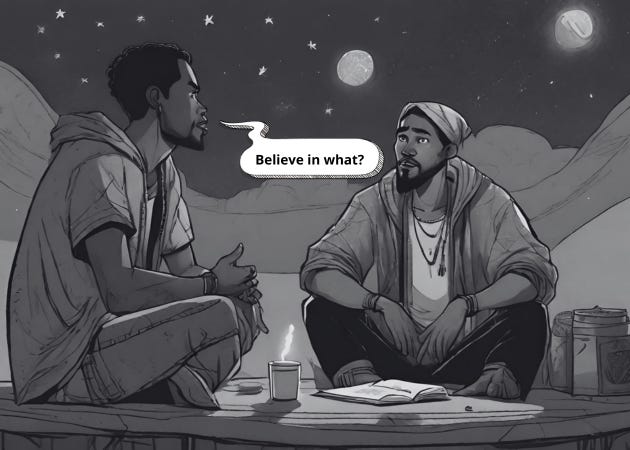Words are the way we communicate from one mind to another. A word is external expression of an internal idea, but it is not a mechanical or quantifiable act in binary code with precise meaning. The same word can mean different things to different people. To “believe” is such a word.
Previously (What is Atheism?), I used Graham Oppy’s book, Atheism: The Basics, for the definition of atheism. “Atheists do not believe in God.” According to Oppy, this means an atheist fails to believe or disbelieves that gods exist because arguments for theism are unconvincing. Oppy distinguishes atheists from “innocents” who are incapable of considering the question and agnostics who have considered the question but not made a judgement. Atheists can and have concluded that they do not believe gods exist.
But this definition begs the next question: what do atheists believe? And how does this use of the word factor into the debate between atheism and theism? In this context, Oppy seems to be saying that the atheist does not have confidence in (does not trust, does not accept) the truth, accuracy, authenticity, or reality of the statement that any gods exist or that a God exists. Conversely, the believer does have confidence in (does trust, does accept) the truth, accuracy, authenticity, and reality of the statement that gods exist, and in the case of Christianity, that one God exists. We set aside, for now, the arguments themselves and examine their purpose. To “believe” means to commit yourself to a worldview, and it is an enormous question.
Oppy addresses the arguments for atheism in the sixth chapter of his book and uses the terms atheistic beliefs and theistic beliefs to refer to logically consistent sets of beliefs for both views. “Belief” is the noun of to “believe,” so it refers to the mental action of having confidence, trust, or acceptance of the truth, accuracy, authenticity, or reality of a set of statements that a God exists. Philosophically, a belief is the ultimate principle or presupposition of knowledge, a primary intuition (OED). Oppy rephrases these beliefs as the atheistic big picture and the theistic big picture (section 6.1). Both big pictures take the same data from the world (sensory input, lived experience) and process it according to different worldviews, each of which could form a logically consistent set. He does not conclude that either atheism or theism is necessarily inconsistent. He looks for the best argument.
He rejects four main arguments for atheism (6.2):
-
that atheism is the default belief,
-
that theism is meaningless,
-
that theism’s worldview is logically inconsistent,
-
that theism’s big picture is logically inconsistent.
For an argument to be successful, in his approach, we first examine both atheistic and theistic big pictures carefully for consistency and address deficiencies (6.3). Then, having refined them, we form the best big picture argument for each (that survives consistency and sufficiency). Last, we examine the big pictures to identify the most theoretically virtuous system of beliefs (6.4). Theoretical virtue is determined by a balance of a) minimization of theoretical commitments and b) maximization of explanatory depth and breadth. Demands the least; explains the most.
A small example is helpful here, I think. If I have a dinner date planned with a friend but find myself thirty minutes after the agreed upon meeting time sitting at the table alone, I might form a system of arguments for the reason that my friend is not there. If I have a worldview in which the logical system entails that people are deceptive, that might explain the circumstance, but it would also entail theoretical commitments that bind me to many other conclusions. If people are deceptive, why would I agree to a meeting in the first place? If people are deceptive, why would I trust a cook in a restaurant? If people are deceptive, why would I even have friends? And so on. Theoretical commitments are not minimized. In turn, this view would not explain all the other times in life when people do as I expected or was promised. Even if I doubted their intentions, I would have no explanatory power for the kindness or love shown me. This would not be a theoretically virtuous system of beliefs. (You might think of better examples.)
Oppy says that the best trade-off is the big picture (belief set) that balances nihilism (no commitments) and particularism (extreme commitments).
Physical science provides abundant examples. A scientific theory’s virtue (power) is indeed a balance of theoretical commitment and explanatory ability. As hypotheses are tested and data is gathered, theories are refined so that multiple explanations for the same phenomena are united into one explanation. Sometimes formulas can be combined. Likewise, laws and theories are advanced that explain the most phenomena. Gravity is not thought of as many different interactions but as one kind of fundamental attraction between things that have mass. Isaac Newton (1684) proposed that gravity is proportional to the product of two objects’ masses and inversely proportional to the square of the distance between their centers, so the one law applies to objects of different masses at various distances apart. Albert Einstein (1915) applied the general theory of relativity to better describe gravity as a function of the curvature of spacetime caused by the uneven distribution of mass. Scientists still seek a unified theory that combines gravity with the subatomic interactions (strong nuclear, weak nuclear, and electromagnetic). So, we need commitments, but only those that are necessary and that explain the most.
Using this approach, Oppy concludes that the atheistic big picture (atheistic beliefs) satisfies this balance best and is the most theoretically virtuous. He says that both atheistic and theistic big pictures can account for the existence of causal reality (6.9.2). They explain the same data, but the atheistic worldview requires fewer commitments to do so in that it does not require the additional belief in gods. Thus, adopting atheistic beliefs, according to Oppy, allows one to explain causal reality best.
In Christianity, we call the set of beliefs a creed (Apostle’s Creed, Nicene Creed, Chalcedonian Creed, Athanasian Creed). These are summary statements. Thomas Aquinas says belief is a twofold truth. In the Summa contra gentiles (book on the truth of the Catholic faith against the errors of the unbelievers), he begins with a long treatment of the human search for truth in Book 1, Chapters 1-12. The arguments for the existence of God follow in Chapter 13. Aquinas explains in Chapter 4:
While, then, the truth of the intelligible things of God is twofold—one to which the inquiry of reason can attain, the other which surpasses the whole range of human reason—both are fittingly proposed by God to man as an object of belief.
What we can come to believe is both through reason and through faith (beyond reason) in what God reveals. Citing Aristotle from ancient Greece, Aquinas says that wisdom is the search for truth, the search to order things rightly.
In Aristotle’s Metaphysics, he explains that the search for causes begins with what is most evident to us, and then we work towards an understanding of the highest causes (book 1, chapters 1-2). We begin with sense experience (just like the scientific method begins with observation) and proceed to more abstract explanations. In Metaphysics, Aristotle was concerned with being. Science today is concerned with laws and theories. Philosophy and theology are concerned with logical deduction or induction. Hence, there are certain things that natural reason can attain as beliefs that point to beliefs beyond reason, although an atheist may not accept the last extension.
Theology is the study of God and is divided into two main disciplines. Natural theology is the study of what reason can tell us about God’s existence and something about God’s essence. Dogmatic theology studies what God reveals in Scripture and tradition. Revelation deals with things reason alone never would discover, such as the beginning of the world in time, creation out of nothing, the Incarnation, the Resurrection, the Ascencion, and the Holy Trinity (three Persons in One God). Without revelation, you could never sit cross-legged under a starry sky with a cup of coffee and figure out that God the Father generated God the Son as an act of divine intellect, for example.
Aquinas points out that a person may never understand the arguments for the existence of God based on natural reason because she is too busy getting kids ready for school or keeping up with laundry (not Aquinas’s exact words), but she still may very well and appropriately so, accept the beliefs of faith revealed in the Bible. He says this is one reason God reveals those truths to us. Not everyone will be interested in the more philosophical arguments or will have the time to learn them. It took me decades to even begin to grapple with those arguments.
The latter approach is sufficient, but it will not be enough if we are going to argue whether atheism is the better system than theism. We will need to get into the arguments provided by reason, which is the point of this project.
It is important to know the difference between beliefs from reason and beliefs from faith. Atheists tend to miss this twofold distinction about beliefs that Christians have. To sum again quickly: the truths of reason are accessible but require patience to study and grasp. The truths of faith cannot be discovered by reason alone, but they are not unreasonable either. They both fit together in the exercise of human inquiry into truth. Ultimately, Christians do not just believe God exists. They believe in God, which means they accept in faith what God, who exists, reveals to humans for the sake of their salvation.
It seems true that the theistic, particularly Christian, set of beliefs entails more theoretical commitments than the atheistic set of beliefs. Maybe that is debatable another time, but I do not find in Oppy’s book an explanation why theistic commitments are unjustified for explanatory power. In the fifth chapter he states that atheists see natural reality as the only causal reality. There is no engagement with the Aristotelian or Thomistic arguments on which natural theology is based.*
It would be a good exercise to examine theistic claims more closely under Oppy’s approach. Perhaps the case could be made that the theoretical commitments, such as a First Mover, First Cause, Intelligent Designer, are justified to explain the cause of natural causes in terms of potentiality and actuality, form and matter, essence and existence — all of which are the basis of Aquinas’s Five Ways. It would also be a good exercise to examine whether atheistic beliefs really simplify a worldview, or whether they do in fact entail an unreasonable set of commitments, or whether they explain as much as they must for a complete big picture. Oppy acknowledges there can be a gamut of positions, and I appreciate that.
The set of beliefs that belong to reason are the only two sets that should be compared in the atheist vs. theist debate. This boundary limits theistic arguments to those of natural theology, such as the Five Ways named by Aquinas (but derived from Aristotle and partially from Plato) as well as other arguments like St. Anselm’s ontological argument that God is “that than which nothing greater can be conceived” and any other modern updates to the arguments.
It would be inappropriate to compare the truths of faith beyond reason that are the subject of dogmatic theology and divine revelation with atheistic beliefs. If we know from the outset that the atheistic belief set does not go beyond reason into questions about what God reveals, then to compare theoretical commitments and explanatory abilities of articles of faith such as the virgin birth of Christ or the formulas of the Holy Trinity is like (to invoke a cliché) comparing apples to mystical oranges. People can be convinced by the truths of faith alone, and as I said before, many are, but those come after someone believes that God exists. It does not make sense to inquire about who God is or what God reveals if one does not first accept that God is.
So, the consideration is defined by the boundary of this question: Does God exist? That is the first belief. Some people grant assent to this belief easily, and some people need the arguments.
Speaking for myself as a chemist before becoming Catholic, conversion came first, and the arguments came later. Circumstances both from scientific studies and from personal experiences compelled me to accept God’s existence. Then I searched for the system of beliefs about divine revelation that were most logically consistent, which led me to Catholicism. Then, in hindsight, the arguments were helpful for understanding what I believe.
It is not the same for everyone. Regardless of how a Christian gets to the point of granting assent to the truths of faith, not only that God exists but that God speaks to us and reveals greater truths which are binding in how we live our lives, Christian faith is a twofold proposition, all of which is summarized in the Christian creeds. I’ll be the first to admit that adopting this worldview comes with many demands that manifest in daily life. But I am satisfied because, as hard as it is, all of my lived experiences are tied up in and explained by my set of beliefs. The main one for me is that I see nature as God’s handiwork, which reorients my entire approach to the physical and biological sciences, restoring my childlike awe and wonder.
I am not writing to atheists alone or theists alone but to anyone interested in the God-question. None of the arguments are new, but they lend themselves to continual advancement. Volumes have been written about the arguments for God’s existence and those to the contrary, all the way back to antiquity. But right now, in almost 2024, I am not satisfied with the way my group, namely Catholics but also other Christian apologists, have engaged with the modern atheist arguments. I, for one, cannot say that I understand what the atheist philosopher means by atheism, and I would like to understand. Plus, I am really irritated when someone assumes the intellectual or moral high ground and looks down at me to bestow his or her great so-called wisdom. I do not look up to people like that but usually think to myself that those people are insecure in their beliefs. I don’t want to be such a person.
I’ll close with a question: Oppy explains that atheists can have many varied beliefs that have nothing to do with God’s existence, and I do not understand this since for a Christian everything flows from that first belief that God exists. So, if you are an atheist or ever were an atheist, how do you understand beliefs? Why wouldn’t they be the guiding principle of your entire life?
Moreso, have I described it correctly? Do you agree with Graham Oppy? Do you have other resources? Ideas? Corrections? Suggestions? Additions?
*This is a topic of its own.








